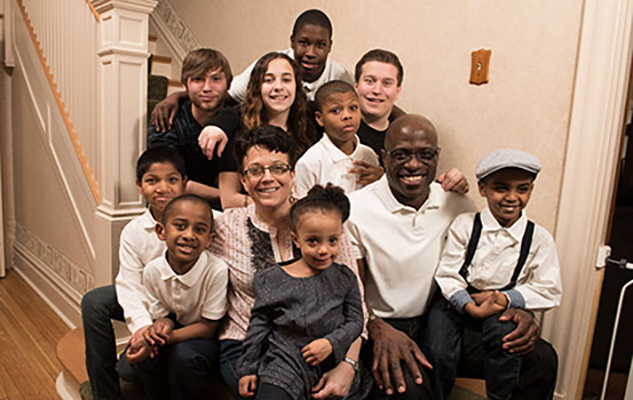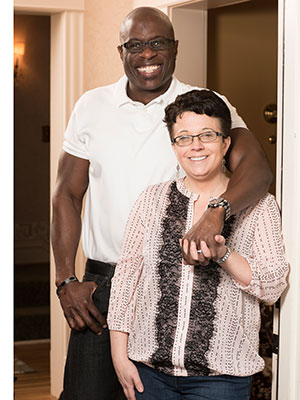
Melissa Hopkins has a big heart. Several times she told an adoption agency that she wasn’t interested in adopting any more children. But the agency — through which she already had adopted several kids— kept sending her videos about children who needed homes. Sure enough, she would change her mind.
Hopkins, assistant vice chancellor and assistant dean of facilities operations at Washington University School of Medicine, had five children with her first husband and adopted two boys, one from Russia and the other from Guatemala. The couple divorced, and Hopkins adopted two brothers from Ethiopia as a single parent. She married again in 2011, and she and her husband, Rod, had a baby girl together, and Rod became the adopted boys’ legal father.
Since relocating from Houston to Belleville, Illinois, in 2013, they have become foster parents of two teenage boys they plan to adopt, and they are in the process of adopting an 8-year-old girl from China. Additionally, Melissa Hopkins recently became a board member of the Court Appointed Special Advocates (CASA) of Illinois. CASA trains volunteers to advocate for the best interests of abused and neglected children in courtrooms and communities.
Rod Hopkins closed a construction business he had owned for 24 years to follow Melissa here for her job. Now a stay-at-home dad, he and Melissa believe that the biggest difference they can make in the world is to change lives one by one.
“My family is amazing,” she said. “It feels pretty easy to us to have these children.”
Hopkins grew up in two families — her parents divorced and both remarried — that also took in children in need of stability. In addition to three biological siblings and three stepsiblings, she has two adopted and three foster siblings. She also has known great loss in her life. Her son, Ryan, died at age 20.
“My parents taught me that family comes first, no matter what,” said Hopkins, who grew up near Ithaca, New York.
Her father made his living as a fire chief and a logger. Her mother was a seamstress and small-business owner. They also taught her the value of hard work.
Hopkins listened to that, too.
A wide-ranging career
In the past 20 years, she has built a wide-ranging career in facilities and program management in hospitality, education and health care.
At the School of Medicine, Richard Stanton, associate vice chancellor of administration and finance, said Hopkins has brought a new energy and perspective to facilities management.
“She has established a customer-focused orientation to our range of services,” he said. “And her initiatives to reduce spending by more than $2 million in our budget have been achieved — and accomplished — by setting a standard of excellence from which the savings flowed and not by arbitrary cuts in required resources or levels of services to students, faculty and staff.”

Previously, Hopkins served as executive director of facilities management at the University of Houston, associate vice president of facilities operations and development at The Ohio State University, and regional operations and facilities manager for CH2M HILL, an international engineering consulting firm.
She started managing facilities at age 23 by happenstance. She was working on a bachelor’s degree in law and justice and had dreams of becoming a lawyer when she landed a job as a business analyst at Pacific Medical Center and Clinics in Seattle.
A month after she started the job, her boss, Dr. Meredith Mathews, asked Hopkins to oversee key projects at the center’s 13 clinics. She stayed at the company for four years, during which time she was promoted to manager of central operational services. Meanwhile, she earned a degree from Central Washington University in 1995.
Hopkins said Mathews was the greatest mentor of her career. “His belief in my capabilities is what opened the door to my future, my confidence and my desire to serve,” she said.
Today, she oversees 350 employees and the day-to-day operations of facilities engineering, design and construction, support services, business operations and protective services at the School of Medicine. She also manages the medical school’s capital construction budget of about $50 million and a $35 million operating budget.
Hopkins always has enjoyed managing facilities. “I like being responsible for the stewardship of a place and take pleasure in knowing that I have a part in the overall mission,” she said.
Innovative and resourceful
She has been described by colleagues at Washington University as extremely innovative and resourceful in her roles.
“Melissa often has found ways to provide better service with fewer resources,” said Steven Reynolds, executive director of finance and administration in the Department of Medicine. “One of the reasons she’s successful is that she is very calm and thoughtful.”
Hopkins consolidated custodial services, facilities engineering and parking and transportation into an integrated service center in Olin Hall and created a disaster-response planning unit to safeguard the medical school and St. Louis community from extraordinary events such as fires or tornadoes.
Soon after arriving, she also helped create a lactation task force to make private space more accessible for breastfeeding employees, students and trainees. Camaryn Chrisman Robbins, MD, assistant professor of obstetrics and gynecology, worked with Hopkins on the task force. The School of Medicine and Barnes-Jewish Hospital later were recognized by the state of Missouri as a breastfeeding-friendly worksite, largely due to Hopkins’ efforts, Robbins said.
“Melissa is efficient, task-oriented and inclusive,” she said. “She succeeded in keeping a group of clinicians, trainees and nonscientists on task, which was no small feat. I look forward to working with her on future projects.”
Hopkins appears to have a knack for managing countless responsibilities, at work and home. The hardest part of her job, she said, is the volume of work and the pace. At home, like many parents, her biggest challenge is keeping snacks in the house, she quipped.
Comments and respectful dialogue are encouraged, but content will be moderated. Please, no personal attacks, obscenity or profanity, selling of commercial products, or endorsements of political candidates or positions. We reserve the right to remove any inappropriate comments. We also cannot address individual medical concerns or provide medical advice in this forum.